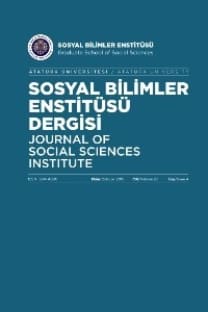William Faulkner’in “Ayı” adlı Öyküsüne Ekoeleştirel Yaklaşım / Ecocritical Approach to “The Bear” by William Faulkner
ekoeleştiri, Faulkner, evrensellik, ekolojik ve çevresel konular,
ecocriticism, Faulkner, universality, ecological and environmental issues,
___
Aytür, N. (1968). “William Faulkner’ın Eserlerinde İnsanın Tabiatla İlişkileri”. Ankara Üniversitesi Batı Dil ve Araştırmaları Dergisi, 3(1), 103-127.Bookchin, M. (1996). Ekolojik Bir Topluma Doğru. (A. Yılmaz, çev.). İstanbul: Ayrıntı. Faulkner, W. (1991). Ayı. (M. Belge, çev.). İstanbul: İletişim.
Fromm, H. (1996). “From Transcendence to Obsolescence”. C. Glotfelty-H. Fromm (Eds.). The Ecocriticism Reader: Landmarks in Literary Ecology içinde (p. 30-39). Athens, Georgia: The University of Georgia Press.
Glotfelty, C. (1996). “Introduction: Literary Studies in an Age of Environmental Crisis”. C. Glotfelty-H. Fromm (Eds.). The Ecocriticism Reader:Landmarks in Literary Ecology içinde (s. xv-xxxvii). Athens, Georgia: The University of Georgia Press.
Halman, T.S. (1963). William Faulkner: Hayatı Sanatı Eserleri. İstanbul: Varlık
Jardins, (2006). Çevre Etiği: Çevre Felsefesine Giriş. (R. Keleş. çev.). İstanbul: İmge.
Love, G. (2003). Practical Ecocriticism. Charlottesville and London:University of Virginia Press.
Roszak, B., Roszak, T. (2000). “Deep Form in Art and Nature”. L. Coupe (Ed.). The Green Studies Reader: From Romanticisim to Ecocriticism içinde. (s. 223226). Florance, KY, USA: Routledge.
Stein, R. (2000). “To Make the Visible World Your Conscience:Adrienne Rich as Revolutionary Nature Writer”. J. Tallmadge-H. Harrington (Eds.). In Reading Under the Sign of Nature:New Essays in Ecocriticism (p. 198207). Salt Lake City: The University of Utah Press.
Ünder, H. (1996). Çevre Felsefesi: Etik ve Metafizik Görüşler. Ankara: Doruk.
White, L. (1996). “The Historical Roots of Our Ecological Crisis”. C. Glotfelty-H. Fromm (Eds.). In The Ecocriticism Reader:Landmarks in Literary Ecology (p. 314). Athens, Georgia: The University of Georgia Press.
Yamazato, K. (2003). “Kitkitdizze, Zendo, and Place: Gary Snyder as a Reinhabitory Poet”. M. P. Branch-S. Slovic (Eds.). In The Isle Reader: Ecocriticism,19932003, (p. 10-21). Athens, Georgia: The University of Georgia Press.
- ISSN: 1304-4990
- Yayın Aralığı: 4
- Yayıncı: Atatürk Üniversitesi Sosyal Bilimler Enstitüsü Müdürlüğü
Seyahatnameler’de Sinop / Sinop at the Travelogues
Süreyya EROĞLU, A. Alev DİRER AKHAN
Okul profili araştırması (Kars ili örneği)
Rasim TÖSTEN, Murat DAŞDAN, Kurtuluş BULUT, Volkan KARAKAYA
Tahakkuk esaslı devlet muhasebesinde bütçe hesapları ve muhasebeleştirilmesi
Murat SERÇEMELİ, M Suphi ORHAN
Merter AKINCI, Ergün AKTÜRK, Ömer YILMAZ
M.nazan ARSLANEL, Ertuğrul ERYÜCEL
